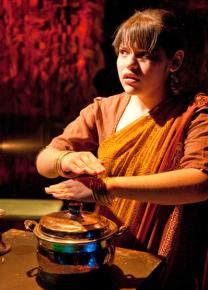Playing with our food
reviews Feast, a play about food and people hungry for better lives.
YOUR PARENTS probably told you not to play with your food. Fortunately, that's exactly what the members of the Albany Park Theater Project (APTP) did, and it's made for a great play called Feast, now reopening in Chicago starting October 15 for a one-month run.
APTP brings together a group of teenagers who live or go to school in the Chicago neighborhood of Albany Park to work with a core of theater professionals. Each year, the APTP company picks a theme, spends months researching and collecting stories from family, friends and people in the neighborhood, and shapes what they've gathered into a script.
After selling out its spring performances and a slot at the Latino Theater Festival this summer, APTP has brought Feast back for another month of performances.
The theme for Feast, obviously enough, is food, but you'd be amazed at how many different directions the stories take, and their globe-spanning reach.
Or maybe not. Food is by necessity a central part of human life, and always has been. How it's grown or gathered, bought and sold, prepared and eaten--all of these tell an important story about the wider society and culture.

EACH SCENE of Feast grows out of the diverse Albany Park neighborhood in one way or another, and they're all the more powerful and direct for it.
The everyday humiliations of poverty are captured in a monologue by Meena about how the commercial brand names call out to her on a trip with her family to the discount grocery chain Aldi's--it's performed to a kind of dance that finds her behind, in front of, inside, on top of, and wrapped around a shopping cart. Her words are interspersed with a heartbreaking story from Malcolm about the shame he feels because his family has to use food stamps for groceries.
In another scene, the backbreaking labor of a sugar cane worker in Puerto Rico is captured in a song:
Nos mandaban a cortar por una, dos o tres horas,
Y después, escogían varios y los demás...esos sobran.
Los mandaban a su casa sin mediar ni una palabra.
Sin paga, sin dar las gracias, sin esperanza, sin nada.They would tell us to cut cane for one, two or three hours,
And then they would choose the strongest few...and the rest were left behind.
They were sent home without pay, without thanks, without hope, with nothing.
Feast then travels from the fields to the making of meals in kitchens, with a dark portrayal of the world as seen through the eyes of young girls playing games of jump rope, while they see a future of domestic labor ahead of them. Then there's the story of a woman who is expected to cook for her husband after their arranged marriage, but is terrified of her own stove.
Another scene tells the story of an immigrant couple who lose their jobs in the recession and, in desperation, try to make a business of selling tamales from a cart. They're rescued after their first failed attempts by a "fairy godmother," who shares her family's generations-old recipe.
None of the actors in Feast are out of high school yet, but you'd never know it from the maturity and skill they bring to their performances--which outdo plenty of professional theater I've seen. In fact, the company's youth may explain the keen eye for detail and emotional honesty in all of the scenes.
The storytelling is further enhanced by the theater techniques the company has learned from the professional staff at APTP. For instance, for one scene, a group of actors rings the stage with the electronic gear used by foley artists to create the sounds of everyday life you hear, but never notice, in a movie. The sound effects turn a simple tale about raising a cow into a feast for the ears.
Feast turns out to be about a lot more than food. It's a powerful and entertaining window onto society--the individual tragedies and triumphs, and the bigger questions of a system that makes something as essential to human beings as food into a continual source of insecurity and suffering.


